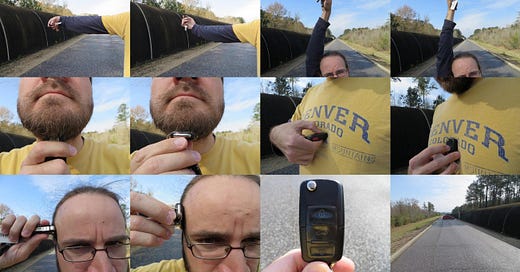Many people think personal science is about health, a natural assumption since it’s something we all care about and a great application of science. But the techniques are applicable to other areas as well.
This week we look at a personal science approach to cars.
Key Fobs
Does that keyless entry system in your car work as well as you’d like? Chris Mueller did a simple experiment where he marked out the successful unlocking distances while holding his key fob at different parts of his body.
He recorded the various distances at which his key fob unlocked the car, and then made some graphs and charts, to conclude:
The remote seems to work better when held to the head though the improvement isn’t as marked as one might have expected from a google search of the topic. The best possible orientation seems to be to hold the remote flat against your temple. If you aren’t willing to hold it to your head, pointing it at the vehicle seems to work better than pointing it up, and there doesn’t seem to be much dependence on how high you hold it. Finally, holding the remote to your chest is worse than just holding it at arm’s length.
We like the simplicity of this experiment: quick, practical, and useful to others.
Speeding
Joshua Bloch is a software engineer who didn’t believe he was going 71 in a 55. So he did some of his own extensive research on the LIDAR device that the police used in his case. If you remember a little about pre-calculus physics, it’s easy to calculate why the officer has to be very careful to point at the same place on the car for each measurement. The 1 or 2-meter distance between the windshield and the front bumper matters a lot at these speeds.

Bloch wrote a lengthy easy-to-read presentation with all the details, in which he shows that the LIDAR manufacturers are aware of the problem and include disclaimers in their documentation, but traffic officers are rarely trained well and write many tickets erroneously.
Bloch, through an attorney, managed to get his fine removed after accepting a settlement with the judge in his case.
(See a lengthy geeky discussion on Hacker News)

Oh, and you’d think a personal science issue focused on cars would include tips and ideas for car tracking, especially since it’s so easy and cheap. ODB2 scanners are easy to install and use, cost well under $100 and will record everything about your car’s health. (ODB2 doesn’t do much for electric cars, so early Teslas had to put in a fake one to meet the legal requirements).
I used an early ODB2 device, but that was years ago. If I were interested again, I’d probably consider one of the more serious diagnostic units but what do I know? If you have experience with these devices, let us know or leave a comment.
More links worth your time
Speaking of other applications for personal science:
We wrote about cooking and food in Personal Science Week 08 Dec 2022, with tips on food flavoring, food safety, and more. Highly recommended!
Add “https://cooked.wiki/” to any recipe URL and get a nicely-formatted version that cuts out all the crap to focus just on the recipe itself.

About Personal Science
Collect your own data, think for yourself, and be skeptical. Those are some of the many characteristics of people who practice science for personal reasons. We try to encourage Personal Science through these weekly updates, but most of our posts are on topics that are mostly timeless, so check out our archives for more information.
Personal science sometimes veers into subjects that gets us in trouble with professionals. To avoid exposing these ideas to the unprepared, we have a paid subscription option that includes our Unpopular Science series, with speculations on topics that are likely to make you unpopular, such as our recent on on IQ.
As always, please let us know if you have other topics you’d like us to discuss.




I have a gadget from my insurance company that plugs in under my dash to monitor how many miles I drive per week, as well as my driving performance. It negatively views hard braking, fast accelerations, and driving between midnight and 4 AM. I am currently averaging zero fast accelerations and late night drives per week (I've never had even one of either), but I do have 0.25 hard brakes per week. However, that is still excellent, as the thing is so strict, most people commuting are going to rack up at least several per week, and potentially, multiple times in one particularly bad day.
I live across the street from where I work and have no commute, thus averaging only 65.4 miles per week currently, in other words, 3400 miles per year. AFAIK, I have the maximum discount available, 30%, and while this is the perfect product for me, I don't recommend it to others, unless they happen to be, for instance, a retired, sedate, safe, not easily annoyed driver. I've read online that the hard braking limit is 7 MPH/sec, and while I've trained myself to avoid them, I don't think the majority of people may be able to or even inclined to do so (the device screeches at you when it dings you, so you have immediate, negative, and potentially annoying feedback). I obviously also drive far less miles per week than the average person does.
I used Automatic's OBD2 device for years, it would capture gas mileage + cost for every trip without me having to do anything. Sadly the were acquired by Sirius and shut down...